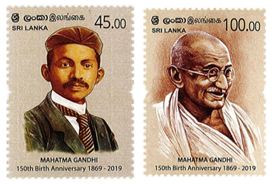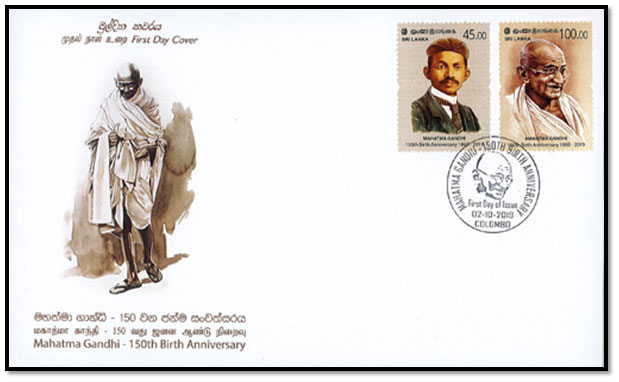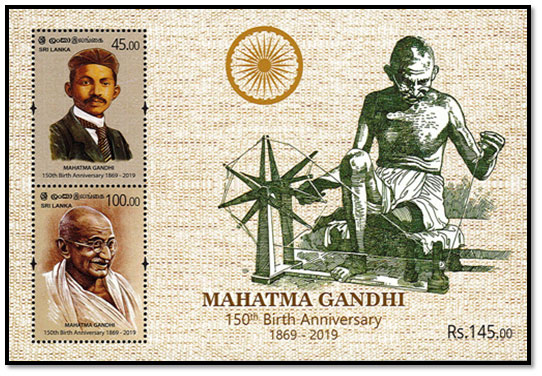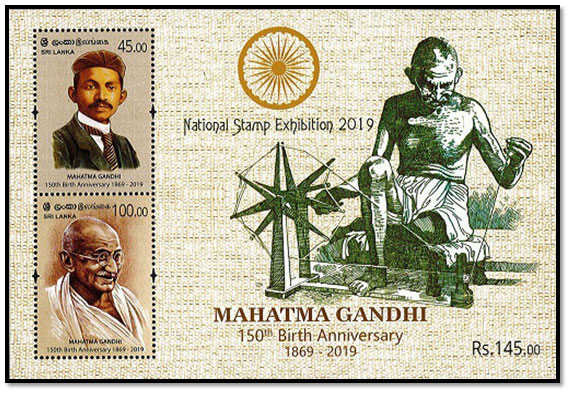

Home/Active Page

The Philatelic Bureau of the Department of Posts, Sri Lanka has issued new postage stamps in the denominations of Rs. 45.00 and Rs.100.00 together with a Miniature sheet on 02nd October 2019 to commemorate the 150th birth anniversary of Mahatma Gandhi.
| Date of Issue | 2nd of October 2019 |
| Denomination | Rs.45.00 ,Ra.100.00 |
| Catalogue No: | Rs.45.00 - CSL 2334 Rs.100.00 - CSL 2335 |
| Stamp Designer | Kumudu Tharaka | Stamp Size: | 30mm x 41mm |
| Sheet Composition: | 20 stamps per sheet |



The Philatelic Bureau of the Department of Posts, Sri Lanka has Issued new postage stamps in the denominations of Rs. 45.00 and Rs.100.00 together with a Miniature sheet on 02nd October 2019 to commemorate the 150th birth anniversary of Mahatma Gandhi.
Mohandas Karamchand Gandhi was born on 02 October 1869 to a Hindu – Modh family in Porbandar, India, which is currently known as Gujarat. His father was Karamchand Uttamchand and his mother was Putlibhai Gandhi. Gandhi had three siblings called Laxmidas, Raliatbehn and Karsandas. At the age of 13 years, Gandhi got married to Kasturbai Makhanji and had four children named Harilal (1888), Manilal (1892), Ramdas (1897) and Devdas (1900).
At the age of 9 years, Gandhi was enrolled at the Rajkot Primary School and he received secondary education at Rajkot High School and Samaldas College until 1988. He received his law degree from the London University in 1891.
Leaving India for employment in South Africa marked a turning point in Mahatma Gandhi’s political career. Having witnessed racial discrimination in South Africa, Gandhi initiated an organization called the Indian Congress in 1894. He lived in South Africa for around twenty one years and continued to advocate for civil rights. Gandhi returned to India around 1915 and joined India’s struggle against the British rulers consequent to an invitation extended to him by Gopal Krishna Gokhale, a senior leader of the Indian National Congress.
Together with Nehru, Gandhi rendered a pioneering service in the fight against the British, carrying out agitations with landless farmers and taking the lead in Satyagrahas. He was arrested by the authorities on 10 March 1922 and was pressed to end the struggle that he was leading. After two years of imprisonment, he was released in 1924. However, Gandhi was imprisoned four times as a political prisoner.
Gandhi and Nehru together declared 26 January 1930 as the independence day of India. The British who did not respond favourably to this stance, imposed a tax on salt, showcasing their monopoly on salt trade. In protest, Gandhi and supporters embarked on a march from Ahamadhabadh to Dandi. This was met with shots fired at protesters, arrests and imprisonment. On 04 May 1930, Gandhi was once again arrested by the authorities. At the end, the Gandhi-Erwin agreement was signed and it was agreed to release political prisoners.
Mahatma Gandhi is the greatest leader in the Indian freedom struggle. Setting aside racial, religion and caste differences, he valued non-violence above all. He was of the conviction that all Indians should be entitled to equal rights. A man of great humility, Gandhi spent a simple and exemplary life. He was of the opinion that Indians should support local industries therefore spun his own cotton and set an example to Indians to use local textiles. Spinning yarn, disregarding caste differences, refusing the consumption of alcohol, harmony between Hindus and Muslims, equal opportunities for women are some of the salient ideologies that characterized Gandhi’s philosophy. He was able to convert the Indian freedom struggle into a non-violent struggle. He used non-violent means such as sathyagraha, non-cooperation, fasts to convey the message. Since these means meant no blood-shed and violence, even the poor farmers and workers could conveniently join in the struggle to show their support.
After gaining independence from the British in 1947, arrangements were made to partition a part of the land as “Pakistan” for the Muslims. Gandhi launched a fast in protest of this move. The objective of his fast was to oppose and stop the Hindu Muslim civil law. After the end of the fast, Gandhi was assassinated on 30 January 1948 while on his way to a prayer meeting. After one year, his assassin was tried and executed.
Birth day of Gandhi is known as Gandhi Jayanthi and is a national holiday in India. From 1937 to 1948, he was nominated for the Nobel Peace Prize on five occasions. In 1930 the Time Magazine named him the person of the year. Before becoming active in politics, Gandhi was an Attorney.
Several books, articles and films have been produced on his life story. The film ‘Gandhi’ screened in 1982 won an Oscar.
All rights received. All right to identify the Department of Posts as the Author and designer of this Bulleting has been asserted in accordance with the Copyright, Design and Patents Act 1988.No part to this publication may be reproduced, stored in or introduced into a retrieval system, or transmitted in any form or by and means (electronic, mechanical, photocopying, recording or otherwise) without the prior permission from the publisher. Any person who does and unauthorized act in relation to this publication may be liable to criminal prosecution and civil claims for damages.)